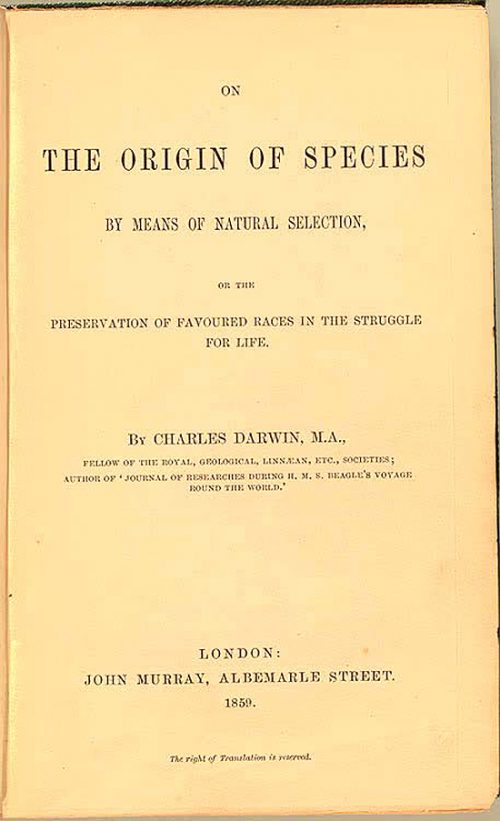Darwin’s Origin of Species was published on 24 November 1859, and people are still mad about it.
You know, biologists don’t really regard this like some people do their Bible. It’s an old, flawed book that is now rather outdated, but contained some really smart ideas that sparked a revolution in biology. We don’t take it literally. We don’t even use it in our classrooms anymore, and we don’t think it’s a particularly good place to start your study of the science, unless you’re deeply into the history of science.
We look at it the same way we think everyone ought to regard the Christian Bible, or the Koran: critically, representing a key moment in the history of ideas.



Well, maybe this comment is somewhat obnoxious, but the Bible does not represent a “moment” in the history of ideas. Although the Torah was largely compiled in the 8th century BC it represent an accretion of older stories and the concept of God and the world changes throughout. Then the concept changes further in the rest of the Tanakh, and again in the Gospels and epistles. So it represent an evolution of ideas over literally millennia. It is full of contradictions and absurdities. Nothing like The Origin of Species at all.
In another year or so, it will be 160 years since the publication of Maxwell’s equations. Exciting times.
This shows a difference between the sciences and the humanities. In the sciences, texts are a means of cognizing things that are not themselves texts. In the humanities, the texts themselves are often the object of study.
Both science and humanities have their place in our society and academia. Studying the texts themselves is also important. Understanding the thought processes and what got the writer of the text to the point of writing the original texts helps us to understand a lot about what has happened to get us where we are. I come out of a humanities education, primarily history, poli-sci and sociology, but my appreciation and desire to grasp hard science allows me, I hope, to see both sides of that debate.
Cervantes@1: “So it represent an evolution of ideas over literally millennia. It is full of contradictions and absurdities. Nothing like The Origin of Species at all.” But a bit like the origin of species, no?
Maybe more like the body of literature that constitutes modern evolutionary biology. An analogy to the bible would be a collection of Darwin’s papers, and Haeckel’s, and Mendel & Morgan & Simpson & Mayr & Coyne & Gould & Maynard Smith & Wilson & Margulis & a hodgepodge of other works, some selected because they’re good and insightful, others by random chance. There’d be contradictions and chaos throughout.
cervantes @ #1
A bit off-topic, but that’s an interesting point depending on what you mean by “compiled.” I understood that something like the Torah was compiled perhaps in the 5th century BC or later. Can you point me in the direction of evidence for 8th century?
good phrasing all ideas and understanding are just that a moment in time that is plain to see. As was said the bible is a compilation of things over a long period of time makes it kind of hard to narrow it down to one particular day. With Darwin there were antecedents but we do have a published date that we can use as the ideas formulated in his writing began to be more widely discussed and understood
our understanding of both evolution and the bible are moving targets as are all of our ideas and understandings
uncle frogy
Thirty years ago, November 21, 1989, Rush released their 13th album “Presto”. The lead off single, “Show, Don’t Tell” says “don’t tell me what to think, present me the evidence and I’ll decide for myself”. The video is even more fitting for today, about science versus creationism in public schools.
Rob Grigjanis (#2) –
It’s not the only important advance that hit big anniversaries in recent and coming years. Napier’s bones turned 400 in 2017, and Oughtred’s slide rule will turn 400 in 2022. The typewriter turned 150 and the bicycle 200 in 2017, and Genaille–Lucas rulers will turn 130 in 2021.
Typesetters in 1859 couldn’t center text correctly on a page?!?
Pierce@11–
That was a standard way of setting books. The text is centered in an imaginary box and the box is offset from center of the page, direction depending on whether the page was verso or recto, so that when the book was opened and two pages were showing, it would form a more pleasing layout.
It’s also just about 104 years since the gravitational field equation papers were submitted; Nov 20 1915 by Hilbert, and Nov 25 by Einstein.
The Origin is a wonderful book, and anyone interested in science should read it, just as they should read Galileo (e.g. Two New Sciences), not just for what he got right – which was a great deal – but also for what he didn’t get right.
But if you read The Origin, read the 1st edition, and best to read it in an annotated edition such as The annotated Origin, annotated by James T. Costa, Harvard Univ. Press 2009.
chrislawson @ # 12 – When did the Victorians develop such a taste for asymmetry?
@2: Rob, you sound like a fan of JCM. So am I. Several interesting biographies out there all about how he figured it out. Have you read them? What a mind. He provided a light for Einstein to follow. I wish I had a tenth of that thinking power between my ears.